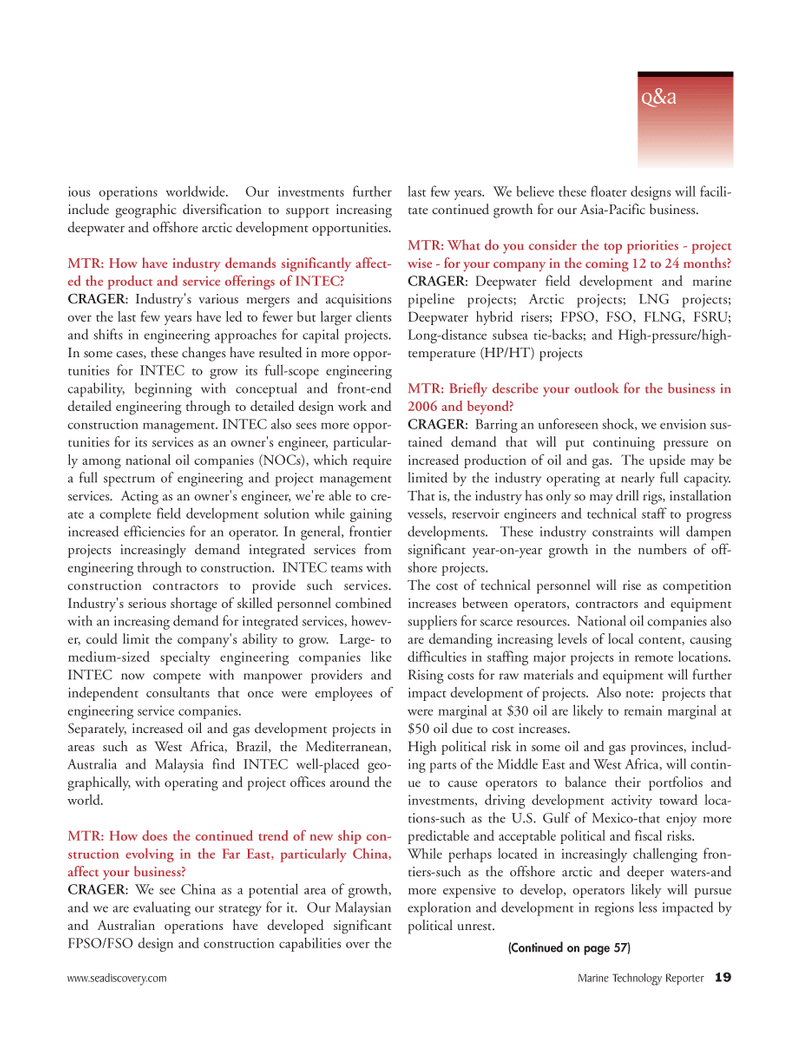
Page 19: of Marine Technology Magazine (July 2006)
Underwater Defense: Port & Harbor Security
Read this page in Pdf, Flash or Html5 edition of July 2006 Marine Technology Magazine
www.seadiscovery.com Marine Technology Reporter 19 ious operations worldwide. Our investments further include geographic diversification to support increasing deepwater and offshore arctic development opportunities.
MTR: How have industry demands significantly affect- ed the product and service offerings of INTEC?
CRAGER: Industry's various mergers and acquisitions over the last few years have led to fewer but larger clients and shifts in engineering approaches for capital projects.
In some cases, these changes have resulted in more oppor- tunities for INTEC to grow its full-scope engineering capability, beginning with conceptual and front-end detailed engineering through to detailed design work and construction management. INTEC also sees more oppor- tunities for its services as an owner's engineer, particular- ly among national oil companies (NOCs), which require a full spectrum of engineering and project management services. Acting as an owner's engineer, we're able to cre- ate a complete field development solution while gaining increased efficiencies for an operator. In general, frontier projects increasingly demand integrated services from engineering through to construction. INTEC teams with construction contractors to provide such services.
Industry's serious shortage of skilled personnel combined with an increasing demand for integrated services, howev- er, could limit the company's ability to grow. Large- to medium-sized specialty engineering companies like
INTEC now compete with manpower providers and independent consultants that once were employees of engineering service companies.
Separately, increased oil and gas development projects in areas such as West Africa, Brazil, the Mediterranean,
Australia and Malaysia find INTEC well-placed geo- graphically, with operating and project offices around the world.
MTR: How does the continued trend of new ship con- struction evolving in the Far East, particularly China, affect your business?
CRAGER: We see China as a potential area of growth, and we are evaluating our strategy for it. Our Malaysian and Australian operations have developed significant
FPSO/FSO design and construction capabilities over the last few years. We believe these floater designs will facili- tate continued growth for our Asia-Pacific business.
MTR: What do you consider the top priorities - project wise - for your company in the coming 12 to 24 months?
CRAGER: Deepwater field development and marine pipeline projects; Arctic projects; LNG projects;
Deepwater hybrid risers; FPSO, FSO, FLNG, FSRU;
Long-distance subsea tie-backs; and High-pressure/high- temperature (HP/HT) projects
MTR: Briefly describe your outlook for the business in 2006 and beyond?
CRAGER: Barring an unforeseen shock, we envision sus- tained demand that will put continuing pressure on increased production of oil and gas. The upside may be limited by the industry operating at nearly full capacity.
That is, the industry has only so may drill rigs, installation vessels, reservoir engineers and technical staff to progress developments. These industry constraints will dampen significant year-on-year growth in the numbers of off- shore projects.
The cost of technical personnel will rise as competition increases between operators, contractors and equipment suppliers for scarce resources. National oil companies also are demanding increasing levels of local content, causing difficulties in staffing major projects in remote locations.
Rising costs for raw materials and equipment will further impact development of projects. Also note: projects that were marginal at $30 oil are likely to remain marginal at $50 oil due to cost increases.
High political risk in some oil and gas provinces, includ- ing parts of the Middle East and West Africa, will contin- ue to cause operators to balance their portfolios and investments, driving development activity toward loca- tions-such as the U.S. Gulf of Mexico-that enjoy more predictable and acceptable political and fiscal risks.
While perhaps located in increasingly challenging fron- tiers-such as the offshore arctic and deeper waters-and more expensive to develop, operators likely will pursue exploration and development in regions less impacted by political unrest. q&a (Continued on page 57)
MTR#6 (17-32).qxd 7/11/2006 8:46 AM Page 19

 18
18

 20
20
